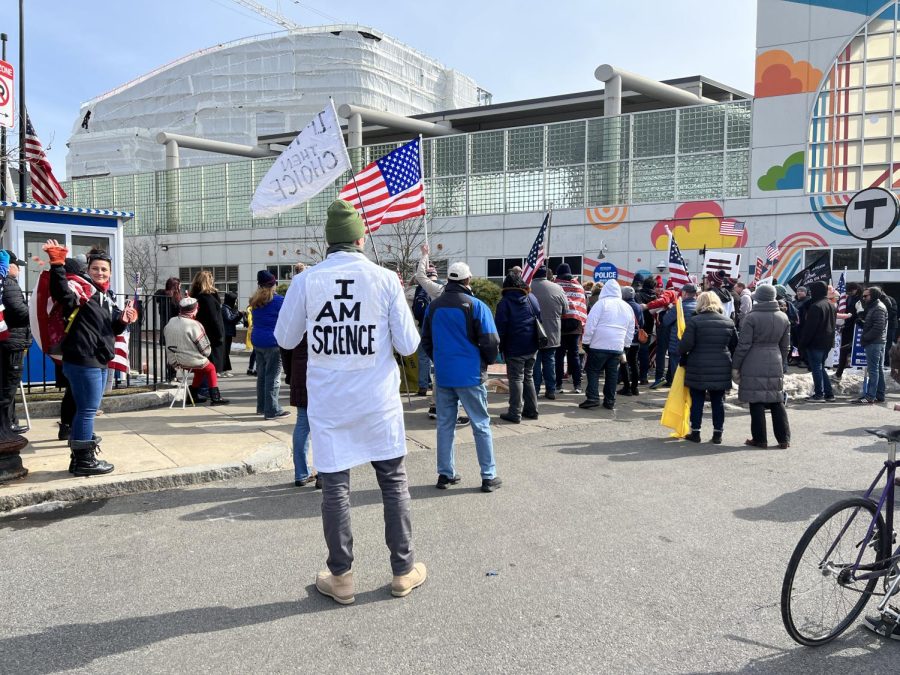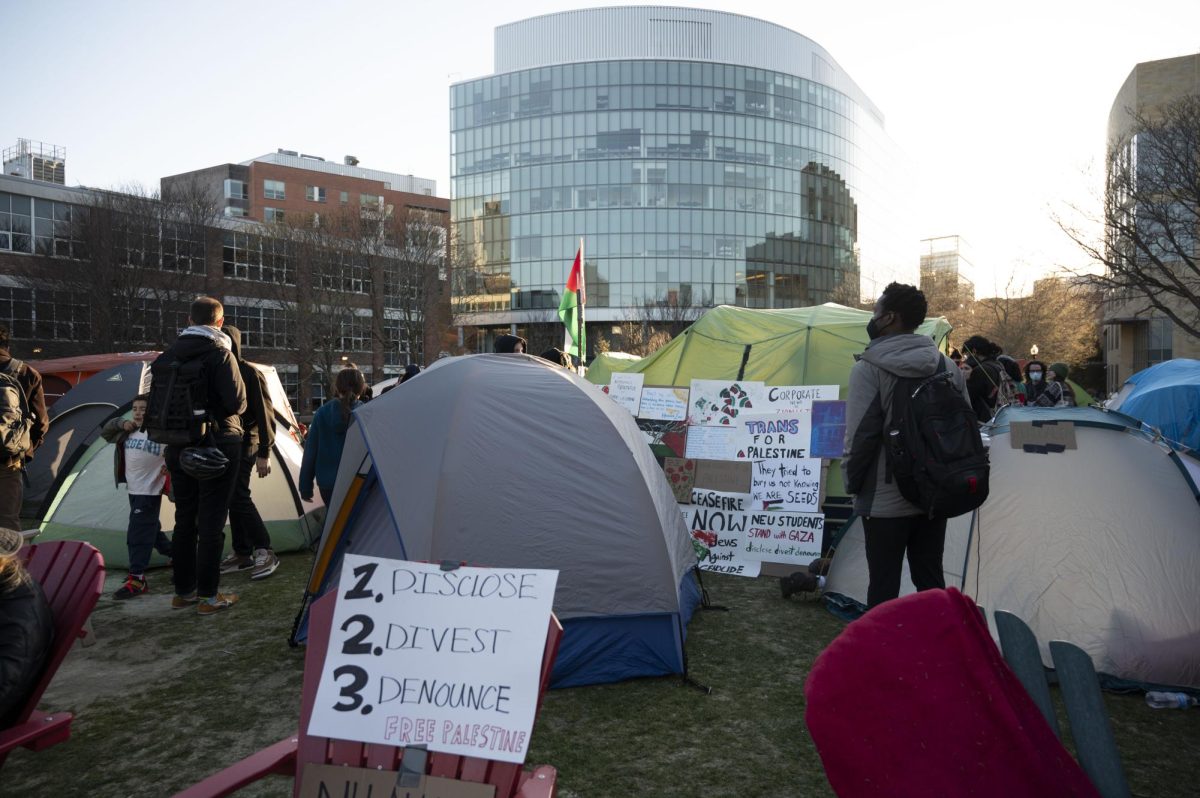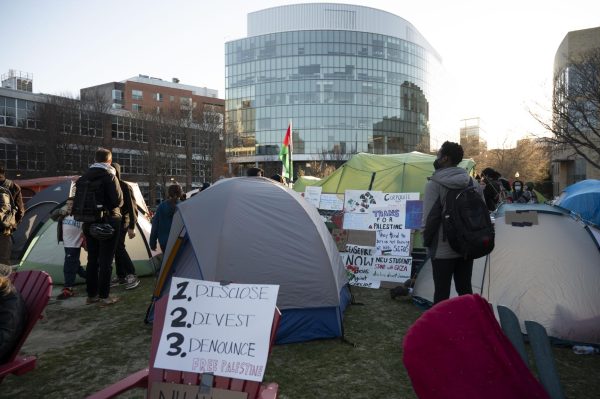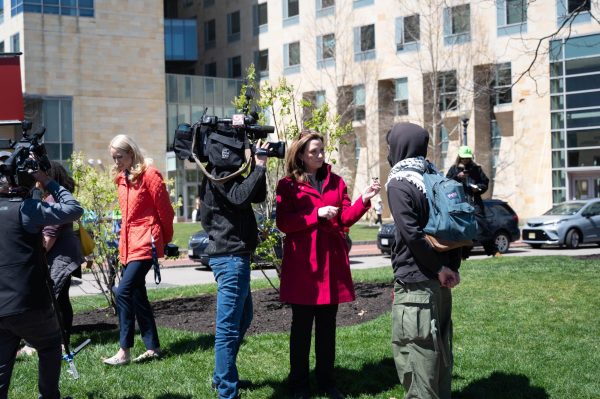Local citizens protest COVID-19 vaccine mandate as mask mandate eases
Individuals gathered at the Ruggles Station Rotary to attend the Massachusetts Say No march for bodily autonomy Saturday, criticizing the state’s COVID-19 mask and vaccine restrictions. Photo credits to Ethan Wayne.
March 5, 2022
About 100 individuals attended the Massachusetts Say No march for bodily autonomy Saturday, starting at the Ruggles Station Rotary on Forsyth Street. The group criticized the state’s COVID-19 mask and vaccine restrictions.
The organization urged Boston citizens to say no to proposed bills H.2411 — filed by Rep. Andres Vargas to remove religious exemptions for COVID-19 vaccination requirements — and S.1517, H.2271 — filed by Sen. Becca Rausch and Rep. Paul Donato with Vargas respectively to form an established immunization program to promote immunity within communities.
Chants of “shame on Wu,” “resist, defy, we will not comply” and “the people divided will never be defeated” among others could be heard throughout the three-hour rally.
People who rallied called on Boston Mayor Michelle Wu to remove COVID-19 vaccine mandates, protesting government overreach. The march took place the same day the city’s indoor mask mandate was lifted. The city also lifted its vaccination mandate in certain indoor places starting Feb. 18.
Protesters held American flags and signs, some reading “Medical freedom is the new Civil Rights movement,” “The great reset will be the end of freedom as we know it” and “No compliance with industry funded $cience.”
Stephen Helfer of Cambridge said current vaccine restrictions have “gone too far” and believes those who choose to be unvaccinated should not be fired by their employer. Helfer was holding a sign that read “Unvaxed lives matter” at the event.
“I think all the way down from the federal government and President [Joe] Biden, there has been an effort to stigmatize and ostracize people who [have] declined vaccination,” Helfer said. “They have become a discriminated against minority and they have rights which should not be trampled upon.”
Sterling D. Smith said this is the first protest she has participated in. The South Shore native said she performed her own research on COVID-19.
“I was a happy-go-lucky Democrat up until about seven years ago, but I was always suspicious,” Smith said. “I started doing research when [COVID-19] hit the fan [and] realized in January 2020 this wasn’t about a virus. It wasn’t about anything other than control of [the younger] generation.”
Among those in attendance was Dianna Ploss, an independent candidate running for Massachusetts governor. Ploss described the march as “a no mask mandate rally” and was interacting with protesters in support of their cause while livestreaming the event.
The group looped around the Northeastern University campus and its surroundings, down Leon Street and to Columbus Avenue and Tremont Street before looping back around Northeastern grounds. Northeastern students could be heard shouting from academic and dorm buildings toward the group.
Smith said she followed Massachusetts Say No’s instructions online but is unclear on the choice of venue for the march.
“Universities used to be a place for open discourse and independent thinking, but this is definitely not the case,” Smith said. “Look at these people wearing masks outside, they don’t even do their own research. It’s sad.”
Other organizations that attended the march include the Health Rights MA, a grassroots initiative that aims to protect the rights of Massachusetts locals on health freedom, as well as Boston First Responders United and Make Americans Free Again Massachusetts.
Helfer said he sympathizes with individuals who lost their jobs due to vaccine mandates and those who cannot enter establishments due to their immunization records.
“We have medical rights that apply to our bodies and these should not be trampled upon by businesses or [the] government,” Helfer said.
Ethan Wayne contributed to the reporting of this article.


















